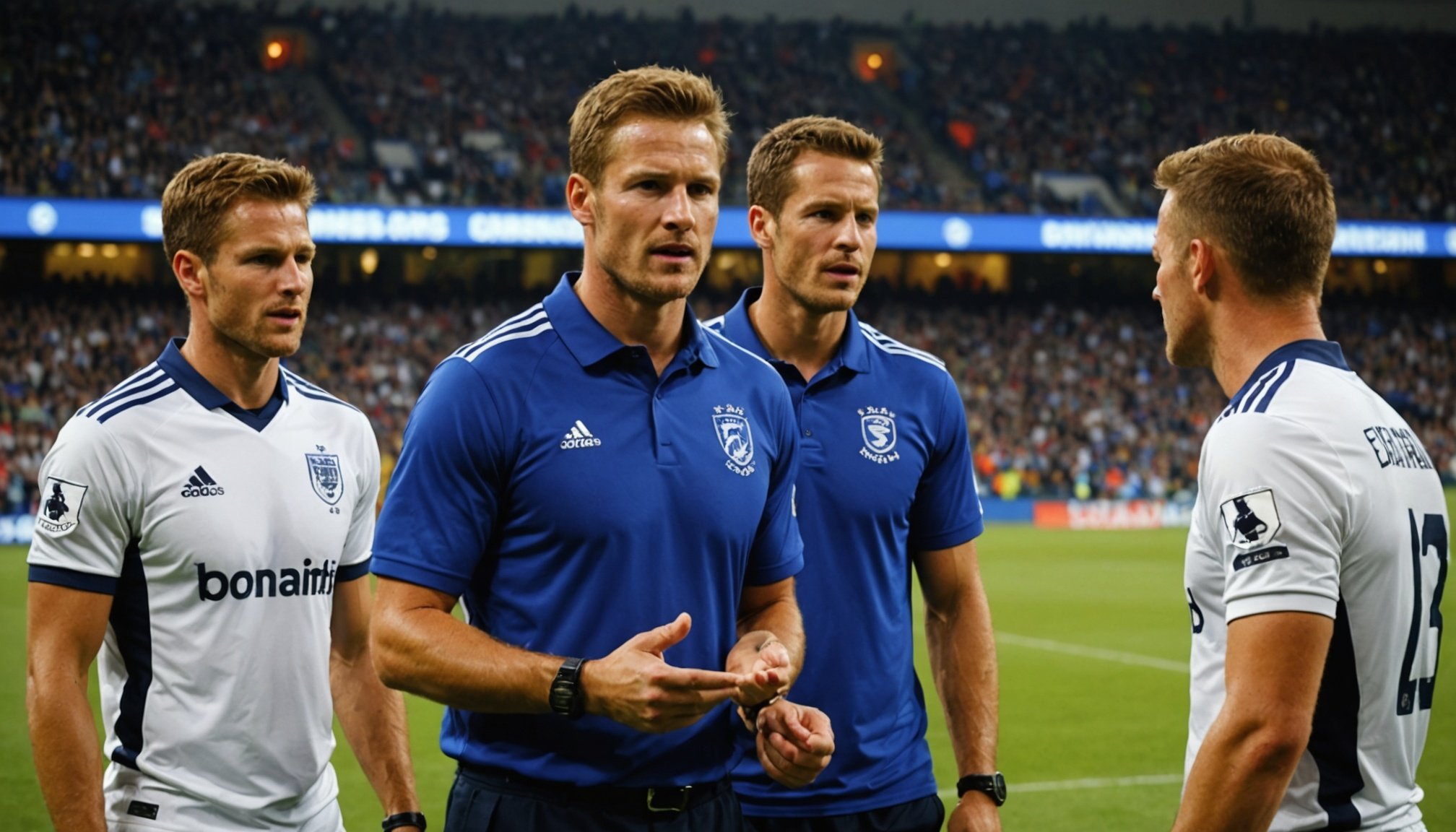Winning Conversations: Key Communication Tactics for Football Captains to Thrive Under Pressure in High-Stakes Matches
In the high-pressure world of professional football, effective communication is the backbone of any successful team. For football captains, the ability to communicate effectively under pressure can be the difference between victory and defeat. Here, we delve into the key communication tactics that football captains can employ to lead their teams to success, even in the most intense matches.
The Importance of Effective Communication in Football
Effective communication is not just a skill; it’s a necessity in football. It builds trust, prevents mistakes, and boosts team morale. As highlighted in the context of goalkeepers, “clear, consistent communication builds trust between the goalkeeper and the defenders, and it can prevent costly mistakes such as poor marking or failing to close down attackers”[1].
Also read : Elevate your game: the impact of altitude training on football teams” tournament success
For captains, this means being the vocal leader who directs and motivates the team. Here are some reasons why effective communication is crucial:
- Trust and Cohesion: When players feel heard and understood, they trust each other more. This cohesion translates into better teamwork and a more unified performance on the field.
- Error Prevention: Miscommunication can lead to mistakes, such as missed assignments or blown coverages. Clear communication ensures everyone is on the same page.
- Morale Boost: A captain who communicates effectively can keep the team focused and motivated, even during tough moments in the game.
Key Communication Tactics for Football Captains
Foster Open Communication
Encouraging open and honest communication is vital. Here are some ways captains can foster this:
In parallel : Elevate your game: cutting-edge approaches for football teams to boost pre-match warm-up effectiveness
- Regular Team Meetings: Hold regular team meetings where players can express their feelings and concerns. This creates a safe space for dialogue and helps in resolving conflicts early.
- Active Listening: Captains should listen actively to their teammates, validating their emotions and seeking solutions together.
- Constructive Feedback: Focus on giving constructive feedback rather than blaming others. This helps in improving performance without damaging team morale.
### Example of Open Communication
Imagine a scenario where a player is struggling with their positioning during a game. A captain who fosters open communication might call a quick huddle during a break in play and ask the player if they need any adjustments or support. This immediate feedback can help the player correct their mistake and regain confidence.
Define Roles Clearly
Clear role definitions are essential to avoid confusion and conflict. Here’s how captains can ensure this:
- Clear Instructions: Coaches and captains should clearly outline each player’s responsibilities and expectations before and during the game.
- Transparency: If changes occur, such as shifting a player’s position, communicate the reasons behind them. Transparency builds trust and prevents resentment[3].
### Example of Clear Role Definitions
During a pre-game briefing, the captain might say, "John, you're our primary defender on set pieces. Make sure to mark the tallest player and communicate with the goalkeeper." This clear instruction ensures John knows his role and can execute it confidently.
Use Positive and Clear Language
The language used during communication can significantly impact the team’s performance. Here are some tips:
- Positive Reinforcement: Use positive language to motivate players. Instead of saying “don’t make mistakes,” say “let’s focus on our strengths.”
- Simple and Direct: Use simple, direct language during games to avoid misunderstandings. For example, “Mark the man!” or “Switch!” are clear and actionable instructions[1].
### Example of Positive and Clear Language
In a high-pressure situation, a captain might say, "Let's stay calm and focus on our game plan. We've got this!" This positive reinforcement can boost the team's confidence and keep them focused.
Leadership Under Pressure
Leadership in football is not just about giving orders; it’s about inspiring and guiding the team through tough times. Here are some key aspects of leadership under pressure:
Emotional Control and Mental Toughness
Captains need to maintain their composure under pressure. Here’s how:
- Stay Calm: Leaders who remain calm and constructive during tough moments inspire the same behavior in others.
- Mental Toughness: Developing mental toughness through training and experience helps captains make better decisions under pressure. This can be achieved through specific coaching and leadership training programs focused on mental resilience[3].
### Example of Emotional Control
During a critical game, the score is tied with only minutes left. The captain, despite the pressure, remains calm and encourages the team to stay focused. This calm demeanor helps the team to think clearly and make better decisions, ultimately leading to a winning goal.
Decision Making and Adaptability
Captains must be able to make quick and effective decisions during the game. Here are some strategies:
- Read the Game: Captains should be able to read the game and adjust the team’s strategy accordingly. This might involve changing formations or making tactical adjustments.
- Adaptability: The ability to adapt to the opponent’s strategy is crucial. Captains should be able to recognize patterns and adjust the team’s approach to counter them[2].
### Example of Decision Making and Adaptability
In a match where the opponent is dominating possession, the captain might decide to switch to a more defensive formation to absorb the pressure. This quick decision can help the team regroup and launch a counterattack when the opportunity arises.
Building a Winning Team Culture
A winning team culture is built on strong communication, trust, and mutual respect. Here are some strategies to achieve this:
Foster Inclusivity
Inclusivity ensures every player feels valued and part of the team. Here’s how:
- Celebrate Diversity: Celebrate cultural differences by learning about teammates’ backgrounds. Simple gestures like sharing meals from different cuisines can create a sense of belonging.
- Value Every Player: Ensure every player, regardless of their role, feels appreciated. This can be done through recognition of their contributions during team meetings or post-game discussions[3].
### Example of Inclusivity
A team might have a pre-game meal where each player brings a dish from their cultural background. This simple gesture can create a sense of unity and make every player feel valued.
Lead by Example
Captains and senior players set the tone for the team’s dynamics. Here’s how they can lead by example:
- Model Respect and Hard Work: Captains should model respect, hard work, and positivity. This behavior inspires the rest of the team to follow suit.
- Fairness and Consistency: Coaches and captains should demonstrate fairness and consistency in their treatment of players. This minimizes perceptions of favoritism and builds trust within the team[3].
### Example of Leading by Example
A captain who consistently shows up early to training, works hard, and supports their teammates sets a strong example. This leadership by example can inspire the rest of the team to adopt similar behaviors, leading to a more cohesive and motivated team.
Practical Insights and Actionable Advice
Here are some practical insights and actionable advice for football captains to improve their communication and leadership skills:
Continuous Improvement
- Reflect on Games: After each game, reflect on what went well and what didn’t. Identify areas for improvement and work on them in the next training session.
- Seek Feedback: Ask coaches and teammates for feedback on your communication and leadership. Use this feedback to make adjustments and improve.
Growth Mindset
- Embrace Challenges: View challenges as opportunities for growth. Encourage your team to do the same, fostering a growth mindset that helps in overcoming obstacles.
- Learn from Mistakes: Mistakes are inevitable, but they are also learning opportunities. Analyze mistakes, learn from them, and move forward.
Leadership Development
- Leadership Training: Participate in leadership training programs that focus on communication, decision-making, and mental toughness.
- Mentorship: Seek mentorship from experienced coaches or captains who can provide guidance and support.
Effective communication and strong leadership are the pillars of success in football. For captains, mastering these skills is crucial for leading their teams to victory, especially in high-stakes matches. By fostering open communication, defining roles clearly, using positive and clear language, and leading by example, captains can build a winning team culture that thrives under pressure.
In the words of a seasoned coach, “A team that communicates effectively is a team that can overcome any obstacle. It’s not just about the game plan; it’s about the people executing it.”
By adopting these communication tactics and leadership strategies, football captains can ensure their teams perform at their best, even in the most intense and pressure-filled situations.
Table: Key Communication Tactics for Football Captains
| Tactic | Description | Example |
|---|---|---|
| Foster Open Communication | Encourage players to express feelings and concerns. | Regular team meetings, active listening. |
| Define Roles Clearly | Clearly outline each player’s responsibilities and expectations. | Pre-game briefings, transparent role changes. |
| Use Positive and Clear Language | Use positive reinforcement and simple, direct language. | “Let’s stay calm and focus on our game plan.” |
| Emotional Control and Mental Toughness | Maintain composure under pressure, develop mental toughness. | Stay calm during critical game moments, participate in mental toughness training. |
| Decision Making and Adaptability | Make quick and effective decisions, adapt to the opponent’s strategy. | Change formations based on the game’s flow, recognize and counter opponent patterns. |
| Lead by Example | Model respect, hard work, and positivity. | Show up early to training, support teammates consistently. |
Detailed Bullet Point List: Strategies to Overcome Conflicts and Maintain Team Chemistry
- Foster Open Communication: Encourage players to express their feelings and concerns through regular team meetings or one-on-one conversations.
- Define Roles Clearly: Clearly outline each player’s responsibilities and expectations to avoid confusion and conflict.
- Build Relationships Off the Pitch: Encourage team-building activities off the pitch to foster stronger bonds among players.
- Address Conflicts Early: Address conflicts as soon as they arise to prevent them from escalating.
- Promote Inclusivity: Celebrate cultural differences and ensure every player feels valued, regardless of their role.
- Lead by Example: Captains and senior players should model respect, hard work, and positivity.
- Manage External Pressures: Help players manage off-field stress to prevent it from affecting the team’s performance.
- Create a Positive Environment: Coaches should set the tone by promoting respect and unity, recognizing individual achievements while emphasizing team success.
- Encourage Feedback: Ask players for input on training methods, tactics, or team policies to foster a sense of ownership and reduce friction.
- Resolve Conflicts Fairly: When mediating disputes, remain impartial and focus on facts rather than emotions, guiding players toward mutual understanding[3].











